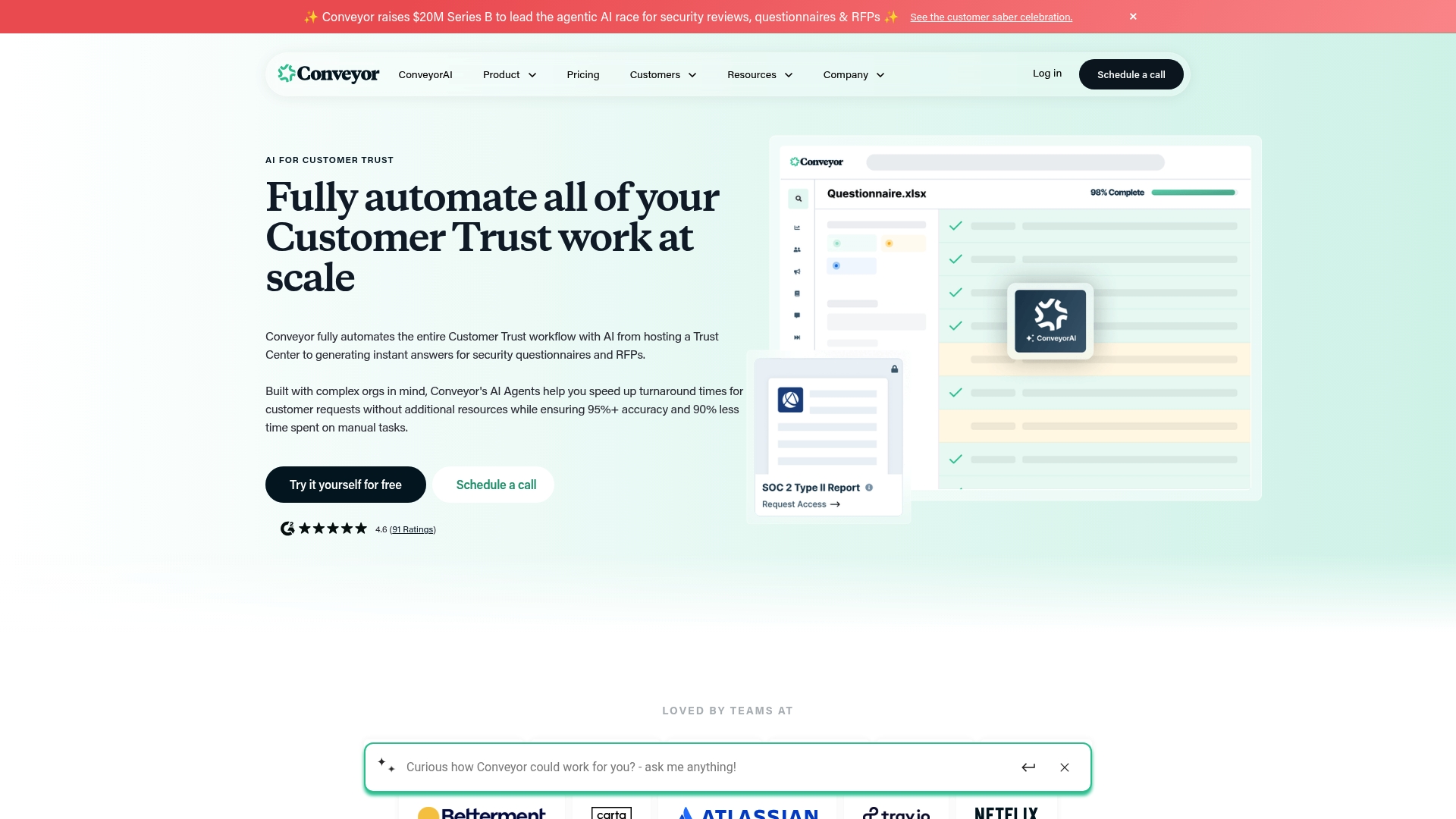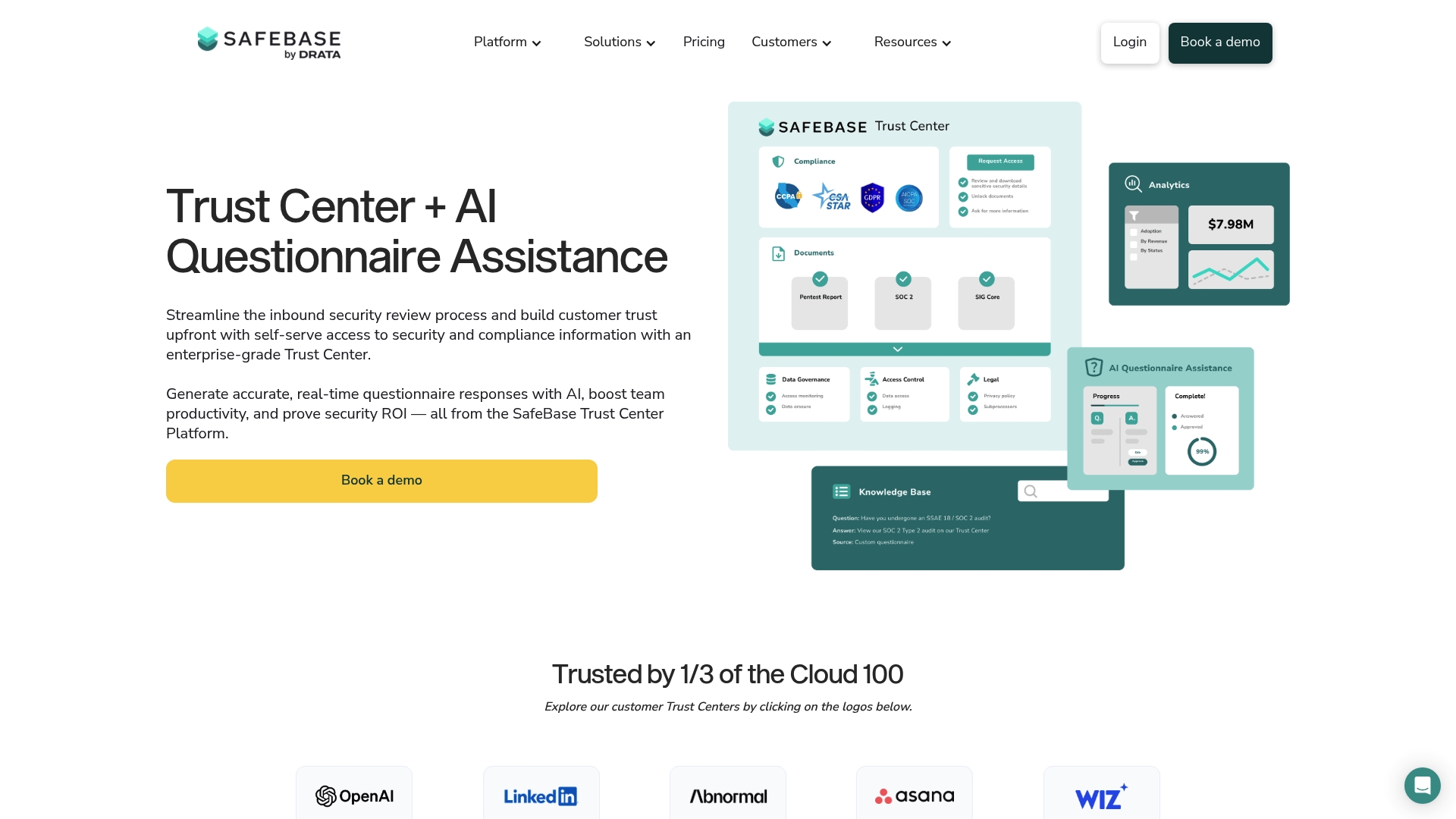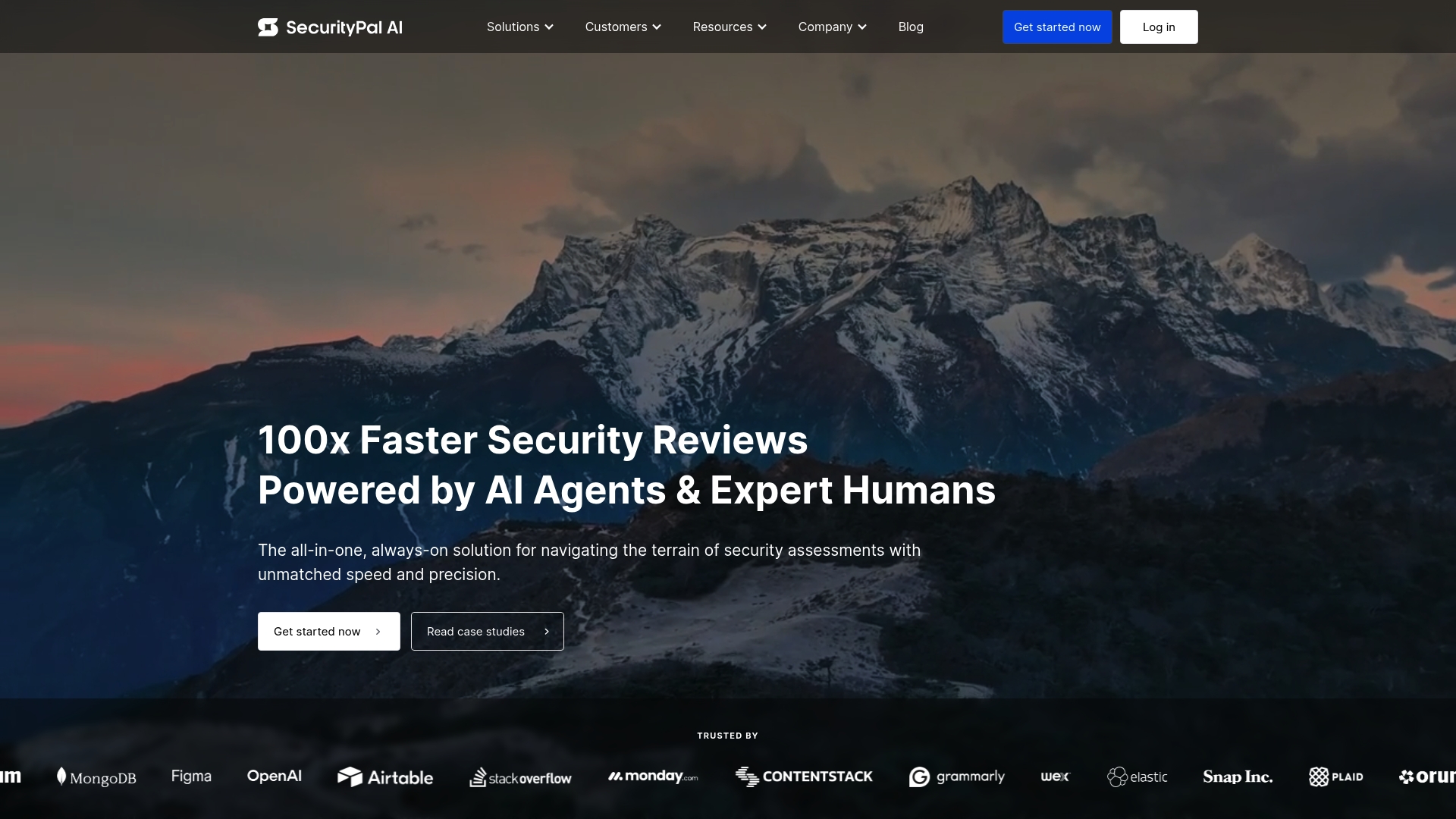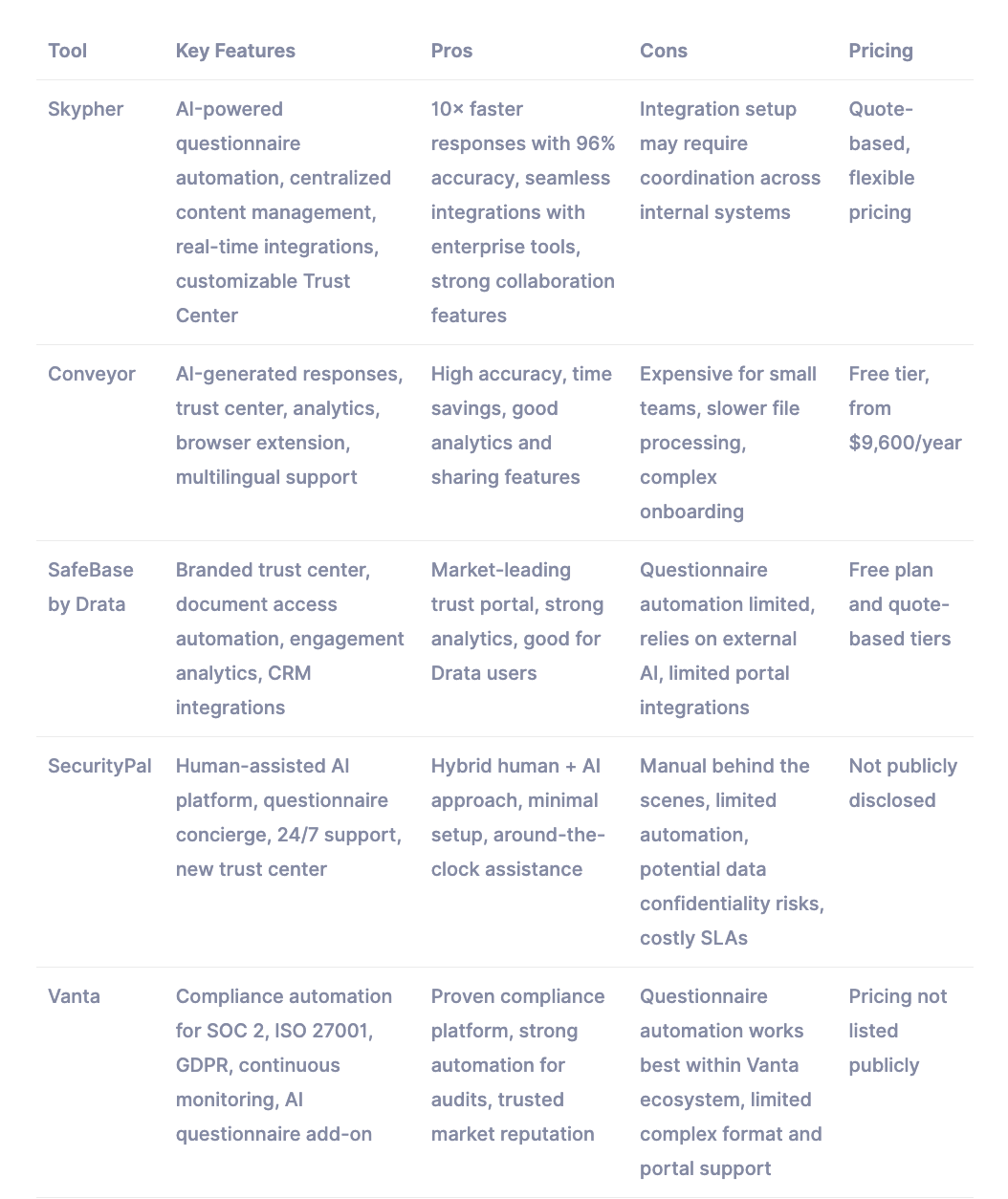
Answering security questionnaires and proving compliance used to drain teams with slow and repetitive work. Now new tools promise to cut this effort from hours to minutes and help companies stay organized even as demands from customers grow. The latest platforms use AI and smart features to handle complex questions, keep content consistent, and make security review faster for everyone. Curious how these solutions compare and which might work best for your team? The details reveal some surprising differences.

Skypher is an AI Agent platform for security questionnaire automation that helps organizations respond 10x faster while maintaining 96% accuracy. Trusted by Fortune 500 companies like Adobe and CMA CGM and technology leaders including TeamViewer, Deel, Swile, and Retool. Skypher is built for teams managing security questionnaires, RFPs, RFQs, and DDQs.
The Skypher AI Agent automates responses, centralizes approved content from all your data sources, and keeps a human in the loop to review and validate answers. This combination of automation and expert oversight strengthens accuracy, shortens sales cycles, and builds buyer confidence.
Skypher also includes a built-in Trust Center that gives prospects and customers secure, always up-to-date access to your company’s security and compliance documentation. It reduces repetitive requests, improves transparency, and accelerates procurement.
Skypher supports questionnaires in all complex formats, including:
This automation not only saves a significant amount of time but also ensures every answer is stored in Skypher for audit purposes and future reuse. Responses are delivered up to 10× faster with 96% accuracy, complete with cited sources and confidence scores.
Skypher also works directly with your existing workflows and tools. Questionnaire intake and tracking can happen directly in Salesforce, while reviews, comments, and responses can be managed in Slack or Microsoft Teams by different SMEs and stakeholders. This gives organizations a single place to assign tasks, review input, and deliver consistent answers without relying on scattered spreadsheets or endless email threads.
Skypher is designed for security, sales, and solutions teams at leading global software vendors and enterprises, including Fortune 500 organizations. If your team spends too much time responding to security questionnaires, struggles with inconsistent answers across documents, or wants to accelerate proof-of-concepts and contract approvals, Skypher fits seamlessly into your workflow.
What sets Skypher apart is its combination of speed, accuracy, and seamless integration into existing processes. It is particularly strong for organizations managing multiple products or entities, where consistency and scalability are key.
Skypher combines a proprietary retrieval model with leading GenAI technologies to deliver fast, source-backed answers with up to 96% accuracy. This helps teams respond to complex security and compliance questionnaires with confidence while minimizing manual work.
Beyond performance, Skypher connects directly to the systems where security knowledge resides. Integrations with Google Drive and SharePoint ensure that answers stay aligned with the latest internal documentation. The platform can also process complex Excel spreadsheets, Word files, and PDFs with tables or images, as well as questionnaires hosted on portals like Archer, OneTrust and ServiceNow. This comprehensive coverage eliminates the need for repetitive copy and paste across hundreds of questions.
Another major strength is Skypher’s automated Trust Center, which allows companies to securely share their latest security documentation, certifications, and audit reports with prospects or clients. Teams can publish a self-service portal where approved users access the right materials instantly, ensuring consistency and reducing back-and-forth during due diligence.
The Skypher AI Agent introduces a conversational interface that lets users generate and refine source-backed answers in natural language. It provides contextual understanding across entities and documents, streamlining how teams review and finalize responses within a secure, audit-ready environment.
Finally, Skypher integrates into daily workflows so that security, sales, and solutions teams can collaborate without friction. Salesforce integration makes it easy to upload and track questionnaires throughout the sales cycle, while reviewers can respond directly through Slack or Microsoft Teams.
In short, Skypher delivers a unified platform that accelerates security reviews, improves accuracy, and reduces the operational burden across the entire organization.
A solutions engineering team at a global SaaS vendor uses Skypher to manage the constant flow of client security questionnaires, many of which include 100 to 400 questions. Instead of copy-pasting answers or searching through scattered documents, the team now pulls directly from past responses, synced policies in Google Drive and SharePoint, and their curated Skypher knowledge base. The platform’s AI generates a first draft with cited sources and a confidence score, allowing the security team to review and validate responses quickly.
By automatically handling questionnaires in Word, Excel, and portal formats, Skypher reduces completion time from days to hours. The result is faster, more accurate responses that build client confidence, shorten procurement cycles, and free up valuable engineering time for higher-impact work.
Quote-based; flexible pricing that requires contacting product specialists for a custom quote.
Website: https://skypher.co
View their Agent in action here: https://linkedin.com/feed/

Conveyor is an AI-driven platform that automates security questionnaires, RFP/RFQ responses, and Trust Centers. Originally spun out of Aptible, Conveyor initially focused on trust portals and data rooms before shifting toward AI-powered automation with the rise of ChatGPT. The platform aims to reduce manual work through large language model–based response generation and centralize compliance assets for faster reviews. It’s primarily used by mid-to-large organizations managing recurring due diligence requests.
Conveyor combines AI-generated questionnaire responses, trust center management, and secure document sharing. The platform supports multiple file formats and offers analytics on engagement and content usage. It includes collaboration workflows and a browser extension for filling questionnaires directly in portals. Conveyor also promotes multilingual support and automation for recurring requests.
However, unlike tools built around custom AI models, Conveyor relies on external large language models such as ChatGPT. This setup can lead to longer processing times, some users report up to 20 minutes for large files, and quite occasional parsing errors when handling complex Excel, Word, or PDF documents. The platform’s confidence scoring is less transparent, as it depends on general-purpose LLM behavior rather than purpose-trained retrieval systems.
Conveyor fits organizations that already maintain a strong internal process for handling security questionnaires and primarily need a trust center to host and share documentation. It is best suited for teams that value centralized document control over real-time automation or conversational workflows.
Conveyor’s main strength lies in its Trust Center and document-sharing capabilities, providing structured visibility into a company’s compliance materials. Its AI layer offers convenience but lacks the customization and performance of platforms built on proprietary retrieval models. Teams looking for faster, more interactive response generation and deeper portal connectivity may find more modern options in other AI-native platforms better aligned with their workflow.
A compliance team at a mid-sized SaaS vendor used Conveyor to host their security documentation and respond to third-party reviews. While it improved document visibility, questionnaire completion still required manual intervention and review due to occasional parsing delays and AI inaccuracies. The team ultimately used Conveyor’s trust center primarily as a client-facing document hub rather than a full automation tool.
Free tier with limited credits. Paid plans start around $9,600/year for the Professional tier, with pricing scaling based on volume and usage.
Website: https://conveyor.com

SafeBase by Drata is a trust-center platform that centralizes and automates inbound security reviews. It combines a branded, customer-facing portal with lighter AI-assisted questionnaire automation. After its acquisition by Drata, the roadmap increasingly aligns with Drata’s compliance ecosystem which is beneficial for Drata users but less flexible for others. SafeBase remains a strong option for teams prioritizing transparency, document access, and analytics over deep automation.
SafeBase provides a customizable trust center where prospects can securely access SOC 2 reports, certifications, and policies, with analytics on engagement and document views. Its AI-assisted automation helps answer questionnaires but is secondary to the portal. Relying on external large-language models limits handling of complex formats such as Excel with macros or Word files with tables and checkboxes. Integrations with online questionnaire platforms like OneTrust, ServiceNow, or Archer are limited, and there is no conversational AI Agent interface.
SafeBase connects with Salesforce, HubSpot, Jira, Slack, Teams, DocuSign, and Ironclad, but organizations outside the Drata ecosystem may see fewer advantages as more features depend on Drata’s internal controls.
Ideal for organizations that receive frequent document-access requests and want a professional, branded Trust Center to demonstrate compliance. Best suited for security and GRC teams focused on transparency and documentation control rather than advanced AI automation as well as Drata users.
SafeBase excels in Trust Center automation and analytics, turning compliance materials into proactive trust assets. Its AI layer is lighter and less effective for complex questionnaires, especially for teams not using Drata. For organizations seeking broader automation, conversational AI, and deeper integrations, other AI-native platforms offer a more advanced alternative.
A mid-sized SaaS company uses SafeBase to automate questionnaire responses with AI, enabling their sales team to answer security questionnaires in minutes instead of hours. They publish a branded trust portal to showcase controls and certifications, which raises buyer confidence, reduces back-and-forth reviews, and helps accelerate deal closure.
Free tier available (Foundation). Advanced and Enterprise plans are quote-based and include expanded customization, analytics, and integrations.
Website: https://safebase.io

SecurityPal is an all-in-one platform that blends AI automation with human support to accelerate security questionnaires and assurance workflows. Originally a human-operated service, the company rebranded around AI within the past year, but much of its delivery still depends on large offshore analyst teams rather than full automation. For organizations seeking a concierge-style approach to questionnaire handling, SecurityPal offers convenience, though it remains heavily service-based behind the scenes.
SecurityPal provides a security assurance suite covering questionnaire completion, trust centers, vendor assessments, and document management. Its “Copilot AI” assists in drafting responses, while human analysts finalize and validate them. The platform also includes analytics dashboards, version control, and 24/7 support.
Because most of the work still involves human analysts—many of whom are contractors or junior cybersecurity professionals based in offshore hubs such as Nepal—content updates are not synchronized with internal systems in real time. This reliance on external personnel introduces potential security and confidentiality risks, since sensitive materials like audit reports or internal policies must be shared outside the organization’s direct control. Integrations with internal tools remain limited, and achieving fast turnaround (such as 24- or 48-hour SLAs) usually requires an additional fee and in-house review to ensure accuracy and data protection.
SecurityPal suits teams that prefer outsourcing questionnaire management to an external provider rather than automating it internally. It’s best for enterprises comfortable with a managed-service model and willing to trade real-time control for human-assisted convenience.
SecurityPal’s strength lies in its hybrid model, combining around-the-clock human coverage with AI-assisted response drafting. This reduces day-to-day workload for security and sales teams but offers less automation, integration depth, and data governance control than AI-native platforms that keep content fully within the organization’s infrastructure.
A sales team forwards customer questionnaires to SecurityPal’s concierge for completion. Within a few days, the vendor returns a completed draft that internal reviewers must validate. The process saves time but requires extra diligence to ensure accuracy and protect confidential content shared with external analysts.
Not publicly disclosed. Costs vary by SLA speed (24- to 48-hour turnaround tiers) and support level.
Website: https://securitypalhq.com

Vanta is a mature compliance automation platform that helps organizations manage frameworks such as SOC 2, ISO 27001, and GDPR through continuous monitoring and automated evidence collection. The platform’s questionnaire automation and trust center capabilities are more recent add-ons that extend its core compliance offering. While these features add convenience for existing Vanta users, they remain secondary to its main focus on audit readiness and compliance automation.
Vanta automates evidence collection for 35 + frameworks, monitors controls in real time, and generates alerts for deviations. It also provides vendor risk management, trust center publishing, and AI-assisted questionnaire workflows. However, the questionnaire functionality relies on external large language models, limiting performance with complex formats such as Excel sheets containing macros or Word files with tables and checkboxes.
Integrations with online questionnaire portals are limited, and automation features tend to work best for organizations already using Vanta’s compliance modules. For companies managing multiple products or entities outside the Vanta environment, setup and maintenance may feel fragmented.
Vanta suits security, compliance, and risk teams that need to automate evidence collection and maintain continuous compliance. It’s most effective for organizations already invested in Vanta’s compliance modules rather than those seeking standalone questionnaire automation.
Vanta’s value lies in unifying compliance automation and continuous monitoring within a single platform. Its questionnaire automation and trust center expand that ecosystem but remain secondary components. For organizations looking for deep automation or complex file and portal coverage, dedicated questionnaire tools may provide greater flexibility.
A growing technology company uses Vanta to achieve and maintain SOC 2 compliance by automating evidence collection and control monitoring. The team also leverages the questionnaire feature to answer routine vendor requests, though complex documents are still managed manually or through other tools.
Pricing is not publicly listed and typically varies based on framework coverage and company size.
Website: https://vanta.com
Below is a comparison of several security questionnaire automation tools, highlighting their unique features, pros, cons, targeted users, and pricing models to help organizations choose the best fit for their needs.

Too many teams still lose hours on repetitive security questionnaires, chasing inconsistent answers and delayed deal cycles. As this comparison highlights, the main challenges are manual processes, scattered documentation, and slow reviews. Skypher eliminates these bottlenecks with its advanced AI Questionnaire Automation Platform, enabling teams to complete even the most complex questionnaires in minutes with answers that stay accurate, compliant, and audit-ready.
With real-time integrations, powerful API connectors, and a fully customizable Trust Center, Skypher centralizes your security content and keeps every response aligned across teams and products. Leading organizations in technology, finance, healthcare, law, consulting, logistics and more are already using Skypher to cut review times, shorten proof-of-concept cycles, and strengthen customer trust.

Experience radically faster, more reliable questionnaire workflows with Skypher. Visit our website to see how AI-powered automation streamlines security reviews from start to finish.
With deep integrations across Slack, ServiceNow, and dozens of third-party risk management tools, Skypher helps you move from manual effort to seamless, automated security reviews, all while maintaining accuracy and compliance.
Don’t let competitors move faster. Schedule a free demo or browse our FAQ to learn more about how Skypher can help your team accelerate security reviews and close deals sooner.
Skypher, Conveyor, SafeBase, SecurityPal, and Vanta and all leading tools aim to simplify and speed up security questionnaire workflows using AI and automation. They centralize security content, provide collaboration and review features, and often include trust centers or compliance integrations to improve accuracy, transparency, and consistency across responses
By automating repetitive tasks, these tools allow teams to respond up to 10× faster than manual methods. Features like centralized knowledge bases, AI assistance, and native integrations with business systems help reduce delays and human error.
Security, sales, compliance, and solutions teams across technology, finance, and enterprise sectors benefit most — especially those handling high volumes of security assessments or detailed vendor reviews.
Most platforms report accuracy above 90%. For example, Skypher achieves up to 96% accuracy, ensuring audit-ready, consistent responses that reduce the risk of rework and strengthen buyer confidence.
Discover the latest news from Skypher whether it is features release, new customer stories, guides or updates